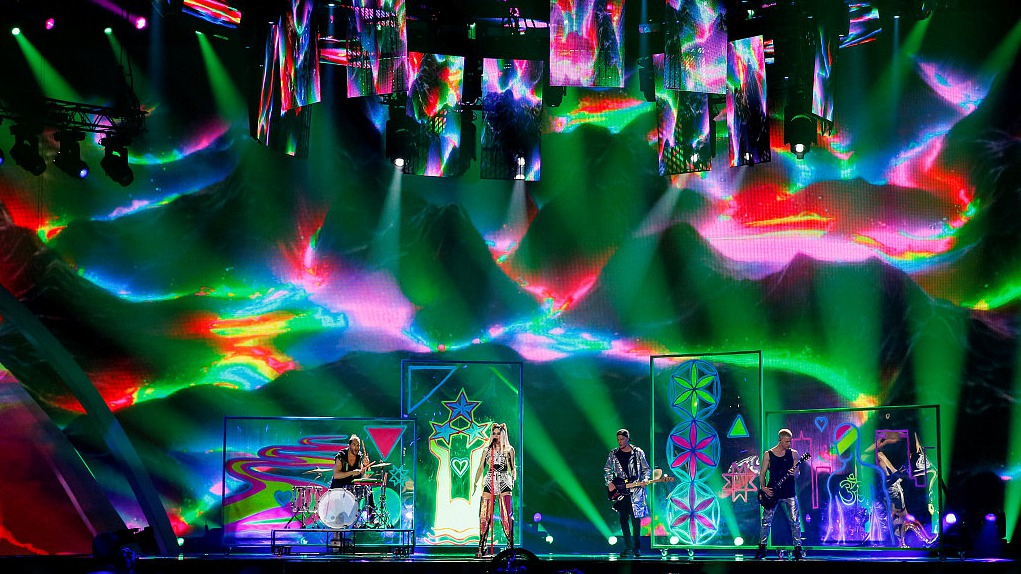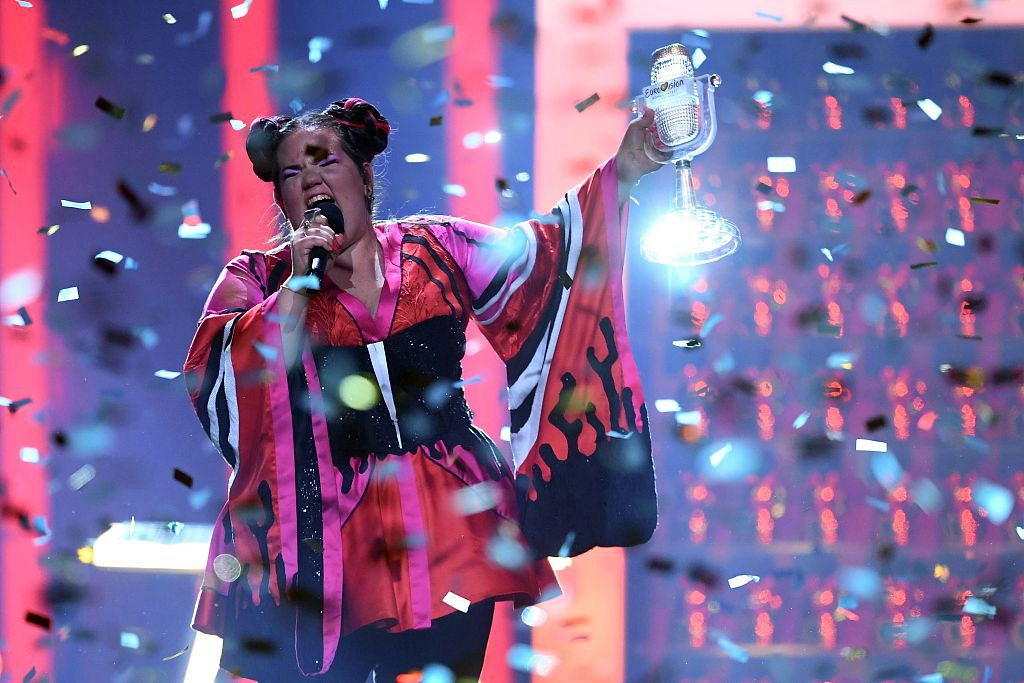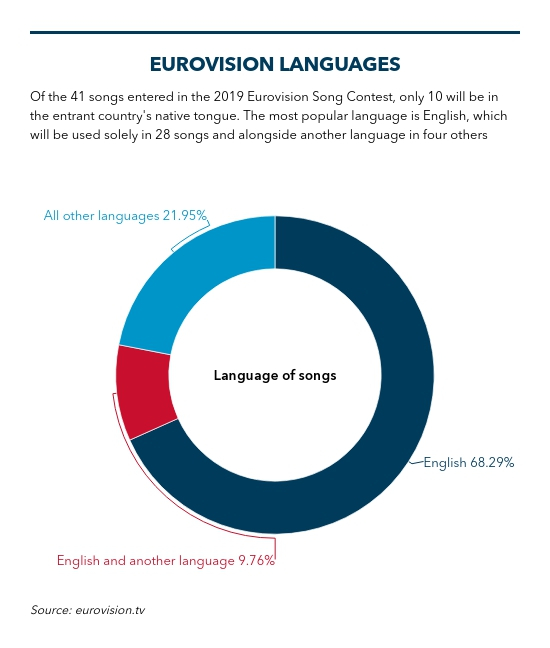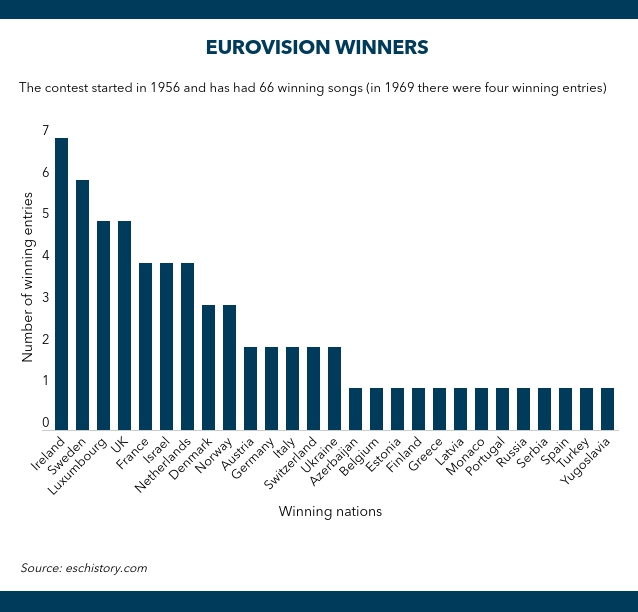
Music
19:59, 30-Apr-2019
A guide to the 2019 Eurovision Song Contest
Updated
09:54, 02-May-2019
By Patrick O'Donnell

What is the Eurovision Song Contest?
The world's longest-running annual televised music competition. It is a live multinational event that pits songs entered by each country against each other. This year, 41 nations will be competing and the entries will be whittled down to 26 for the final on May 18, through semi-finals on May 14 and 16.
Where is it being held this year?
Tel Aviv, Israel. The winning nation hosts the next year's competition. Last year, Netta Barzilai won for Israel with her song Toy.
Read more about her win here: Israel wins Eurovision contest with #MeToo-inspired song

Israel's singer Netta Barzilai aka Netta performs with the trophy after winning the final of the 63rd edition of the Eurovision Song Contest 2018 at the Altice Arena in Lisbon, on May 12, 2018. /VCG Photo
Israel's singer Netta Barzilai aka Netta performs with the trophy after winning the final of the 63rd edition of the Eurovision Song Contest 2018 at the Altice Arena in Lisbon, on May 12, 2018. /VCG Photo
But Israel isn't in Europe…
No, neither is Australia and it is also allowed to compete.
So, who can enter?
Only representatives from nations that are part of the European Broadcasting Union (EBU). A maximum of 44 members are allowed to participate each year. Australia first competed as a special guest in 2015 to mark the contest's 60th anniversary. This was meant to be a one-off event but the country has entered every year since. It is allowed to because Australia's host TV broadcaster SBS is now part of the EBU.
Israel's state broadcaster is also a member of the EBU and it has been competing regularly since 1973.
Ireland has been the most successful country in the history of the competition, winning it seven times. Sweden is a close second, with six wins.
Every year, the so-called ‘Big Five' are guaranteed a place in the final, along with the host country.
Who are the 'Big Five'?
The UK, France, Germany, Italy and Spain. These countries get an automatic place in the final because they pay more to the EBU than the other competing nations.
So, do the same countries compete every year?
No. Countries sometimes drop out for various reasons. This year, Ukraine will not be competing after a row between its state broadcaster and the singer who won the country's public vote to decide who would perform.
Maruv was dropped by UA:PBC after she refused to sign a contract which included restrictions on performing in Russia. On her Facebook account, the singer wrote: "I am a musician, not a puppet for the political arena."
Bulgaria will also be missing from this year's line-up due to financial constraints at state broadcaster BNT, which said in a statement: "The costs of the project far exceed the financial capacity of BNT."
Do the contestants all sing in their native language?

CGTN Photo
CGTN Photo
No. Each participating broadcaster is free to decide the language in which its contestants will sing. This year, 28 entries will be in English, while another four will feature English along with another language. Only 10 countries (including the UK) will be entering songs solely in their native tongue.
But they all have to be from the country they are representing, right?
Errrm… no again. There is no restriction on the nationality of the performers, which has resulted in countries being represented by artists of a different nationality. One of the most well-known winning artists was Canadian pop star Celine Dion, who represented Switzerland in 1988. There is also no restriction on the nationality of songwriters.
The singers are singing – but the musicians…?
The performers must sing live, but use a backing track - live music has been banned in Eurovision performances since 1998 so any musicians on stage are miming.
The rules also state that countries are allowed no more than six performers on stage, all contestants must be at least 16 and songs can last for no longer than three minutes.
Who decides the winner?

CGTN Photo
CGTN Photo
A mixture of viewers and a jury in each country. Voting is compulsory for the juries and nations that entered must vote in the final, whether they made it through the semi-finals or not.
Juries must comprise members who hold one of the following jobs in the music industry: Radio DJ, artist, composer, lyricist or producer.
Also, viewers in the participating countries can vote for their favorite songs by text message, phone, or online.
Neither the public nor the jury can vote for the entrant from their own country and points are allocated to the nation's top 10 acts based on how they ranked in the voting. The most popular act is awarded the maximum 12 points, the second most popular is awarded 10 points, the third-placed performer gets 8 points and then the scoring decreases by increments of one down to a single point for the 10th most popular.
(Cover image: File photo of Latvia's Triana Park performing with the song "Line" during the Eurovision Song Contest 2017 Semi-Final 1 Dress rehearsal 1 at the International Exhibition Centre in Kiev, Ukraine, May 8, 2017. /VCG Photo)

SITEMAP
Copyright © 2018 CGTN. Beijing ICP prepared NO.16065310-3
Copyright © 2018 CGTN. Beijing ICP prepared NO.16065310-3